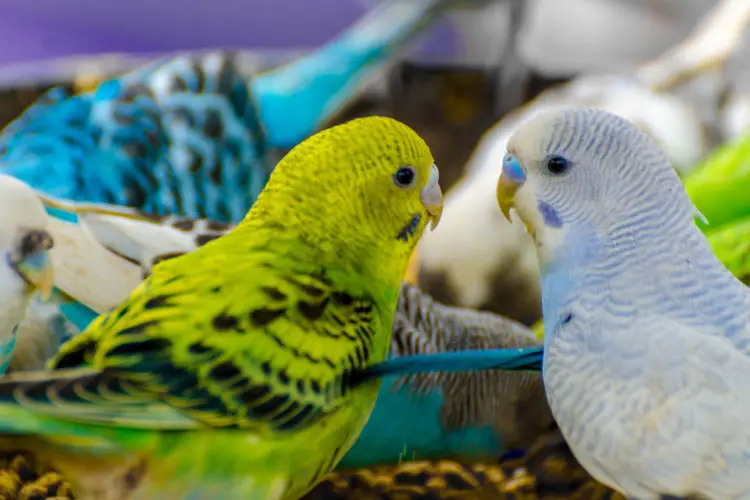As a sincere pet owner, you must notice every little change your budgie shows. One of the common phenomena that your budgie could exhibit is sudden trembling or shaking.
And that could make you panic, thinking, “why is my budgie shaking?” Relax, there could be many reasons behind it, and many of them are not be worried about. They can shake when they’re stressed, happy, excited, or going through some overwhelming emotions. It could also be due to feeling uncomfortable in a too hot or cold environment. If these are the reasons, the trembling may be natural and not last longer when dealt with properly.
But you can’t ignore the possibility of any serious underlying condition causing your bird to shake. Some of which could be malnourishment, fever, or other serious illness. Let’s try to understand the nature of this shaking phenomenon here so you can determine what actions should be taken.
Reasons Why Your Budgie is Probably Shaking
There are both normal and abnormal shaking noticed in budgies. While most shaking or trembling is expected, a few could indicate a severe health concern. Let’s find out what different conditions may cause your bird to shake.
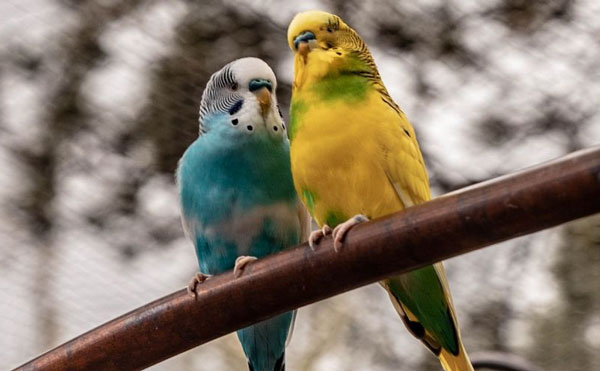
Environmental Factors Causing Stress
Parakeets can get stressed due to unfavorable changes in the environment. Trembling is a natural response to different environmental factors. Some of these could be loud music on your TV or player, dog barks, shattering of vases, or anything that could scare her. If the surrounding is quiet and she’s still shaking, you need to investigate further to find the actual reason.
Feeling Too Hot Or Cold
The suitable temperature range for parakeets lies between 18 – 26 degrees celsius. They can tremble as a response to any temperature that’s hotter or colder than that. If she’s lifting the feathers and shaking them, she might feel hot and try to cool herself down. Setting up a fan or turning the air conditioner can make her normal again.
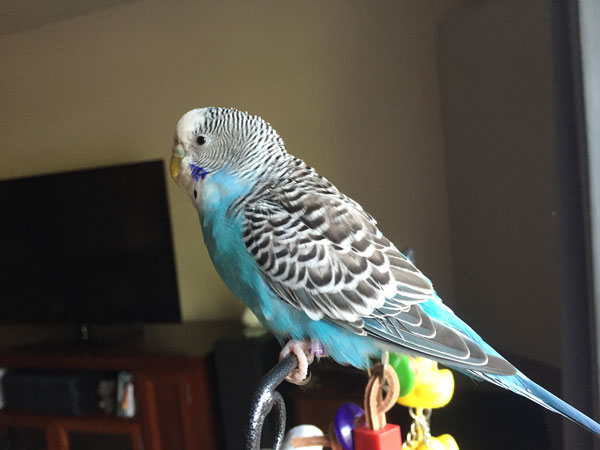
Your budgie may also tremble when it’s too cold outside or has come from a cool shower. Try creating a warmer environment if you think she’s catching a cold, maybe by turning on the heater. Once she feels warm, she’ll stop shaking.
Happiness Or Excitement
Besides stress, overwhelming emotions like happiness or excitement can tremble your budgie. They can get excited if they see you playing with someone or any other bird. They can also shake or flap their wings when acquiring a toy or a treat or also when they return home. It’s a temporary condition, and there’s nothing to worry about.
Preening Or Pre-Flight
Your budgie may be trembling as a part of their regular grooming. They’re often seen to ruffle their feature after preening. It could also be done after a bath to dry and fluff the feathers. However, excessive and persistent preening could be a sign of stress and require your attention.
Besides preening, budgies also try moving back and forth in the cage, often flying around it. While getting ready for the flight, they often become animated and try putting in some extra effort, which can cause their body to shake. It’s pretty normal, and you should see them happily doing it.
Illness
Any underlying illness is the only reason to worry if you see your budgie is shaking. If the shaking isn’t related with any of the reasons above, your budgie is probably suffering from some sickness resulting in tremors or shaking. You can understand if she’s ill by looking at some more signs along with trembling, which include:
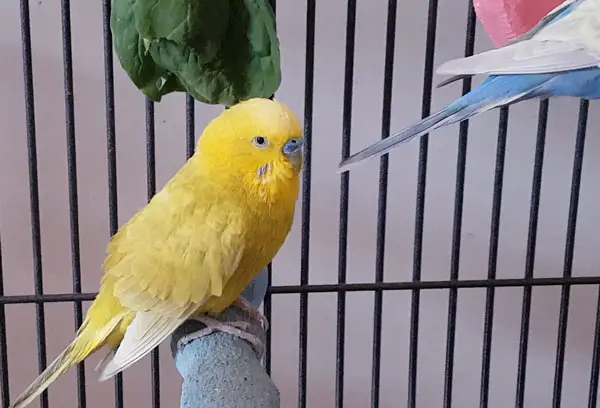
- Lack of appetite
- Crusty eyes or cere
- Whizzing while breathing
- Lack of activity and preening
- Tremors or convulsionss
If you see your parakeet is shaking and showing any of these signs (see more signs of sickness here), take her to the vet immediately as she might need emergency medical attention.
How Budgies Shake When High on Emotion?
Your budgie’s trembling pattern can tell you whether it’s normal or abnormal due to some illness. If you see they’re flapping their wings aggressively in the morning, then it’s because they’re perching. They also naturally shake their wings after a long period of rest.
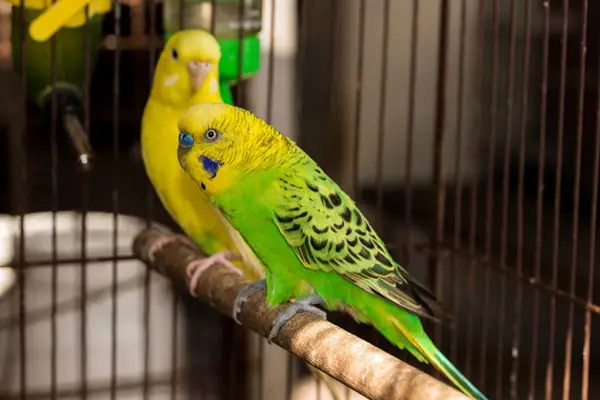
Also, when they finish preening, they shake everything into place with an aggressive shudder. They’ll swiftly waggle the tail to complete the preening session. The mad flappings also occur when they’re excited to respond to a call or chirrup.
Also read: How Does A Budgie Sleep?
How to Distinguish Abnormal Trembling like Seizure or Convulsion?
Although budgie can tremble for several reasons, it shouldn’t be challenging to figure out if she’s going through any seizures or not. A seizure or convulsion can be because of a brain disorder causing sudden electrical discharge in the bird’s nervous system. It can cause your budgie to show violent muscle spasms like flapping wings or twitching legs.
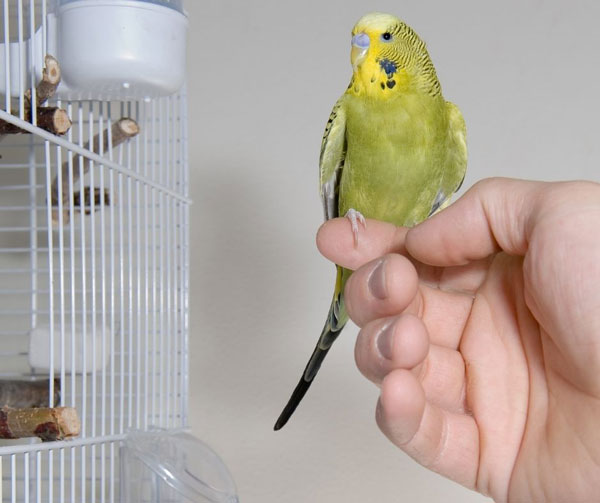
They’re often involuntary, and during a seizure, the bird mightn’t be able to stand appropriately and even lose consciousness. There could be many underlying reasons for seizure in a budgie, such as dehydration, bacterial or viral infection, trauma from a head injury, heatstroke, low blood sugar, and more. If you figure out a seizure in your bird, seek immediate medical attention as it could be life-threatening.
FAQs
If you still have questions regarding why your budgie shakes and how you should react, here we’ve got some common FAQs answered.
You don’t have to do anything if the bird is shaking due to excitement or as a part of the routine. But if it’s due to some environmental factors like uneven temperature or stressful/noisy atmosphere, then you should change the environment and make it suitable for them. And if you see any sign of illness alongside shaking, you should seek immediate medical attention.
Shaking their head, known as head-bobbing, is a normal phenomenon for budgies, and they do it while they’re in the dancing mood. So you need not worry since it indicates that your budgie is happy.
Since budgies are highly social creatures, they’ll most likely find watching television enjoyable with their owner. But they won’t probably like any loud sound coming from the TV; too much loud music can frighten your budgie and cause it to shiver.
Related: Can Budgies Eat Pomegranate?
Final Words
The trembling or shaking is typically a natural phenomenon for the budgies. Instead of worrying, you should enjoy them flapping their wings or bobbing their head when they’re in a good mood, especially after preening or some time of rest. They might also tremble due to unfavorable temperatures, noisy environments, or some other stressful surroundings.
In such cases, you’ve to fix the condition and make it comfortable for your budgie so they can get back to the normal rhythm. Most importantly, keep an eye on your budgie to see if any illness or health concern is causing them to shake. If there are any signs of illness besides trembling, seek medical attention as soon as possible.
